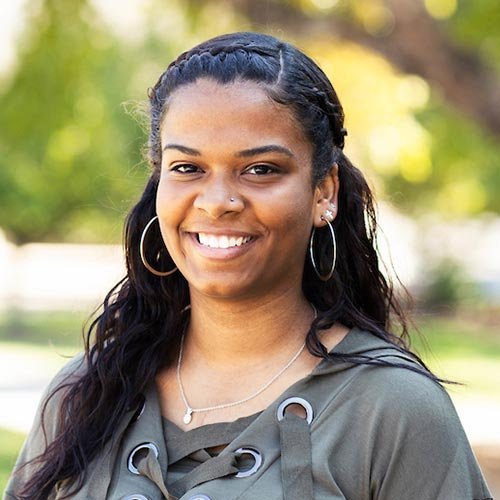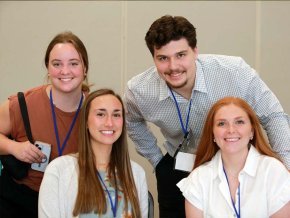Psychology, B.A.
The psychology major provides preparation for diverse career paths, including those that require graduate study.
You will complete coursework from broad subdisciplines within psychology and take a sequence of research methods and statistics courses that enable you to conduct your own research studies.
Many students elect to intern with community partners in a variety of settings. As a graduate, you may pursue careers in research, mental health, ministry, rehabilitation, advocacy, social work, human resources, public health, occupational/physical therapy, among other degree specializations.
In alignment with the university mission, the faculty is concerned with the “development of the whole person” and provide one-on-one mentoring as students select vocational and career pathways.
Request Information
Take the next step toward completing your Bachelor of Arts in Psychology degree at Lenoir-Rhyne University.
Get StartedTake the next step toward completing your Bachelor of Arts in Psychology degree at Lenoir-Rhyne University.
Learning Outside the Classroom
We strive to offer many ways for you to learn inside and outside the classroom.
-
Student Activities & Organizations
You will be challenged to take advantage of independent and collaborative research opportunities that explore a range of psychological topics.
In addition, you will have the opportunity to attend the annual convention of the American Psychological Association. Attended by thousands of psychologists and mental health professionals, the convention lets you attend seminars, workshops and discussions focused on important issues and advances throughout the field.
Qualified psychology students are invited to become members of the LRU chapter of Psi Chi, the International Honor Society in Psychology. Psi Chi was founded in 1929 for the purposes of "encouraging, stimulating, and maintaining excellence in scholarship, and advancing the science of psychology.” It is one of the largest honor societies in the United States, having more than 1,100 chapters.
-
Internships & Careers
Internships with area agencies and organizations provide you with the opportunity to gain experience in the workplace while learning from respected professionals.
A psychology degree prepares you for graduate study and/or entry into a variety of human services opportunities. As a liberal arts major, psychology furnishes a learning environment that prepares you for a diverse array of professions in healthcare, human services, not-for-profit agencies and business.
After the completion of a graduate education, psychology students find careers in clinical psychology, counseling, research, human services, policy and advocacy and education.
Students are encouraged to take advantage of career counseling and job placement programs offered through the university. Advising is also available for students who wish to pursue careers in research, mental health, ministry, rehabilitation, personnel work and agency counseling.
View Internships & Careers
Major Requirements
The psychology major provides preparation for diverse career paths, including those that require graduate study. Students complete coursework from broad subdisciplines within psychology as well as take a sequence of research methods and statistics courses that enable them to conduct their own research studies. Many also elect to intern with community partners in a variety of settings. Graduates may pursue careers in research, mental health, ministry, rehabilitation, advocacy, social work, human resources, public health, occupational/physical therapy and more. In alignment with the university mission, the faculty is concerned with the "development of the whole person" and provide one-on-one mentoring as students select vocational and career pathways. The psychology major earns a B.A. degree.
Honors
Students majoring in psychology may elect to pursue honors work in psychology. To graduate ''With Honors in Psychology,'' students must have a minimum cumulative GPA of 3.0, a minimum major GPA of 3.3 and complete PSY 498 and PSY 499, including defense of a thesis, The honors courses may count as part of the forty-four credits needed for the major.
-
General Education Requirements (37 hours)
Graduation Requirements (4 hours)
General Education Requirements
- Technical Requirements (3-4 Hours)
-
Major Requirements (42 Hours)
- PSY 100 - Introduction to Psychology
- PSY 237 - Psychological Science
- PSY 251 - Statistical Methods in Psychology
- PSY 351 - Research Methods I Non-experimental Methods
- PSY 451 - Research Methods II Experimental Methods
Choose 6 hours from each of the following Dimensions:Dimension ADimension BPSY Major Electives (9 Hours) -
General Elective Credits
General Electives (33-34 hours) as needed to reach 120 hours overall.
-
Total Credit Hours - Minimum 120 hours
On occasion, technical and/or program requirements may also meet specific General Education requirements. Please confer with your program advisor to determine which courses, if any, may be counted accordingly.
All bachelor's degree programs at Lenoir-Rhyne require at least 120 credit hours. If, in combination, General Education, technical, and program requirements do not generate at least 120 hours, additional credits must be completed to achieve 120 hours. These classes may be general electives, or a student may complete a minor or additional major.

The most memorable part about my academic program is the amazing professors and their willingness to always be there for me and help me in any way they can, even after I completed the class.
Admission & Financial Aid
-
Undergraduate AdmissionOur admission team is here to assist you in making the college search process as easy as possible. Our counselors are happy to provide the information and guidance you need to submit your application, apply for financial aid and scholarships, visit and tour our campus.
-
Financial AidWe recognize that paying for college is a top concern for students and their families. Our financial aid staff is here to provide you with financial aid options and assistance to help you achieve your educational goals.
News & Events

Lenoir-Rhyne University students showcased their academic excellence and research expertise at the 2025 North Carolina Academy of Science (NCAS) annual meeting in late March.
View More
Lenoir-Rhyne University has selected Summer McGee, Ph.D, as the institution’s 13th president. Her appointment was enthusiastically approved by the Lenoir-Rhyne Board of Trustees after a national search.
View More